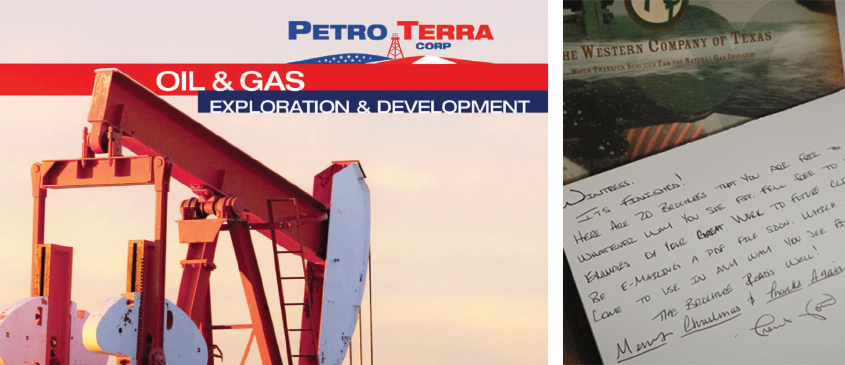Tag: Oil/Gas & Energy
When It Comes to MMbbl vs. Mbbl, You Can’t Be Too Careful
Fun fact! MMbbl and Mbbl can mean the same thing.
Our writing team was recently working on a whitepaper and needed to pull some statistics about oil production volume.
We noticed that, in some of the sources we used, “Mbbl” was used to represent thousands of barrels.
In others, “Mbbl” referred to millions of barrels.
In still others, millions of barrels was written as “MMbbl.”
We had to do a bit of cross-referencing and fact-checking to make sure we knew what we were reading (and writing).
The takeaway?
Don’t assume that “Mbbl” means 1,000 barrels or “MMbbl” means 1 million barrels or that you’ll see these abbreviations used consistently across different publications or industries.
If you’re not sure, take the time to verify.

And, just for fun, here’s something we stumbled across as we tried to unravel the whole Mbbl vs. MMbbl conundrum:
Some people say that the origin of the abbreviation “bbl” for “barrels” dates back to the late 1860s, when U.S. oil producers decided that 42 gallons should be the standard volume for oil barrels.
When Standard Oil started making the 42-gallon barrels, they made them in one color: blue.
Eventually, “blue barrel” — or “bbl” — became synonymous with 42-gallon oil barrels.
Your company’s engineers and SMEs are a wealth of highly specialized, highly technical industry-specific information. But when you need to package their technical knowledge and expertise into client-facing, benefits-oriented marketing materials, a lot can get lost in translation.

The Writers For Hire will work directly with you and your SMEs to create clear, engaging copy that showcases your company’s expertise.
- Your new writing team includes a project manager, writer, and editor who work collaboratively, becoming a seamless extension of your in-house teams.
- Award-winning project management software means we can organize massive amounts of content efficiently.
- Comfortable with quick turnaround times.
- Adept at coming up to speed fast to take on complex long-term and last-minute projects.
Industry Experience
As a Houston-based copywriting firm, we work at the heart of the oil and gas industry. Our writing team has decades of experience in the oil and gas industry, including upstream, downstream and midstream markets.
Some of our writers have joined our team after careers as freelance oil and gas reporters and marketing professionals. Others have come to us from in-house technical writing or communications positions with companies such as Weatherford. Many of our writers have degrees in relevant fields, including geology and civil/environmental engineering.
Past Projects
What type of work have you done in O&G?
Web Copy
We drafted 700+ pages of original web copy for a major pipeline service company’s new site. The project required more than 200 hours of in-depth interviews with SMEs, engineers, and technicians – and it required us to create and maintain a consistent voice that reflected the company brand and identity.
Nonfiction Books
We collaborated with one of our long-term oil and gas clients to research and ghostwrite a 250-page book about the future of the energy industry. Our accompanying marketing campaign, designed to promote interest in the book won the AMA Award for Social Responsibility.
Investor Communications
Several of our financial clients rely on us for sensitive communications involving company performance, changes to the corporate structure, and the economy.
Magazines and Trade Editorial
Our team of journalists has researched, conducted interviews, and written hundreds of articles for trade magazines in midstream, upstream and downstream topics.

Our O&G editorials have been published in:
- Bakken Oil Business Journal
- World Pipelines
- HART Energy Publications
- The Philadelphia Inquirer
- The Denver Post
- Energy Tech
- The Hill
- The Pittsburgh Post-Gazette
An Award-Winning Example
A longstanding client in the energy industry asked our team to create an awareness campaign focused on American energy. The campaign, which was titled “Talk Crude,” included speeches and presentations; ghostwritten blogs; a full-length, thoroughly researched book about energy policy; a website; and social media. The campaign won AMA Houston’s 2016 award for the “Social Responsibility” category. Articles and promotional materials created for the campaign were placed in 41 print and online publications, generated 189 blog hits, and made 48,342 impressions across three leading social sites: Facebook, LinkedIn, and Twitter.
Request A Quote
or
Call 713-465-6860
Thought Leadership
In today’s rapidly moving day and age, business arenas change and evolve all the time. And with all of those transformations and progressions come the want and need for the exchange of ideas, concepts and solutions. The oil and gas industry is no exception. That’s why many companies are incorporating, thought leadership into their business practices. They engage a targeted executive audience with compelling findings dispensed through articles, newsletters, publications and digital media.
Thought leadership revolves around establishing and maintaining a commanding voice about topics of relevance and concern to your target audience. It’s about providing answers to their biggest questions; it’s about addressing the newest hot topics in and offering reliable information—and, perhaps, your own perspective—about those issues. The ultimate goal of employing thought leadership is to establish your company as a leading authority in the world. It’s also a useful way to jump-start relationships where none existed, while enhancing relationships that already exist.
“Our hope is that whoever comes across one of our articles or blog posts will find some value in it,” explains Amal Abdallah, a social media and marketing coordinator for Clover Global Solutions, a Houston-based staffing agency for the industry. “We offer people a new perspective on something, especially if they’re not very familiar with that topic; the written piece sparks interest in the subject and lets people learn more about it.”
Clover’s questions at the end of its blog posts engage readers and spur thought leadership. A recent piece about competence assurance evoked quite a few responses. “It’s a way educate, inform, promote discussion and encourage people to think outside the box,” says Abdallah. “And we’ve been getting some really good responses from people who agree that it’s very important. They then offer their opinions on different types of disciplines within the industry.”
Practicing and disseminating thought leadership has numerous benefits. Besides educating readers about O&G, companies also use it to start new relationships, strengthen existing affiliations, build brand familiarity and form brand loyalty. Thought leadership content also gives companies exposure in their lines of work; it places them in the forefront of—and in a position of authority about—the current conversations and issues in their businesses.
Thought leadership can come from any source: executives, customers, product managers, designers, customer service reps and sales people. Each employee has a unique point of view, as well as valuable knowledge and experience.
AECOM recently tackled the issue of how people with creative minds and spirits can positively influence sustainable communities associated with extraction projects around the world. Paul Fennelly, senior vice president of business development for AECOM Environment business line, was invited by New York’s Storefront for Art and Architecture to participate in a panel discussion called Environments of Extraction. Fennelly developed a theme around the concept that most oil & gas exploration and production projects have a finite lifetime of 25 years, and one can think of them as having a discrete beginning, middle and end. Fennelly’s contributions to the panel resulted in some lively discussion about the future of fossil fuels and how the audience can learn more about sustainability issues surrounding large scale extraction.
Cardno, which has been providing services to clients ranging from global corporations to local specialized companies for more than 30 years, recently answered some of these questions regarding Australia: What’s the economic outlook for the industry in Australia, and what opportunities are there for growth?; Do you foresee continued growing demand for across international markets?; and, What are the top environmental concerns relating to the industry, and how can they be addressed?
Cardno experts Paul Webber (sector leader – Energy, Australia and New Zealand) and Anthony Lane (senior principal – Cardno Lane Piper) provided some valuable insights into this escalating sector.
And BP has addressed the topics of personal health and safety, readiness in case of an oil spill, sharing and embedding lessons learned from major accidents and managing the impact on protected wildlife
“Our thought leadership topics go with what the trends of the industry are,” says Clover Global Solutions’ Abdallah. “For example, if somebody is looking for a position in oil and gas, we address the best city to live if you want to work in that field and where the hot spots for oil in America are. In another example, we had a blog post that talked about some of the steps you can take if your company is being acquired by another and you might be losing your job.”
Clover believes that people seek out thought leadership because O&G is an incredibly dynamic industry that requires you to stay not only with game but also ahead of the game.
Abdallah sums up the role that thought leadership plays in her company’s 2014 plans: “We want our end result to be to find somebody who may be interested in working for Clover or who is interested in acquiring Clover as a client. Ultimately, though, we want to be sure that we can always offer intuitive and informative and educational blog articles as thought leadership so that we keep that level of integrity and professionalism.”
“”
A PRIMER
Thought Leadership 101
Writing a compelling thought leadership piece begins with the development of a topic. But if that first step seems like a big leap, take heart: Here’s some advice to clear the way and help you create a topic that will resonate with your readers.
- Thought leadership is an entry point to a relationship. A successful thought leadership article will intrigue, challenge, and inspire even people who are familiar with a company. It will help start a relationship where none exists and enhance existing relationships.
- Being an expert on something doesn’t automatically make you a thought leader. Thought leaders have a knack for sharing knowledge.
- Thought leadership requires an immediate information outlet, such as a blog, that allows you to comment quickly on news and changing circumstances in your field.
- Your thought leadership article should deliver answers to the biggest questions on the minds of your audience. Remember: The audience determines what the questions are. Keep the “I” out of your article as much as possible and focus on “You.”
- How do you know what’s on your audience’s mind? Ask! If possible, query your readers directly. But if that’s not possible, you can follow the example of an international oilfield services company that is embarking on a thought leadership campaign. They surveyed key managers who are close to customers to get a sense of what the customers are thinking.
- Some of the questions the company asked its managers were:
- What are the most pressing concerns of the oil and gas operators you talk to? What do they want to do better/smarter/more profitably?
- What have they been surprised to find out? What areas do they wish they knew more about or felt more competent about?
- What are the questions they ask you?
- What have you been asked to consult with operators about?
- Before you put pen to paper or fingers to keyboard, ask yourself if the topic you’re considering:
- addresses a timely issue
- offers new insight
- identifies an issue that readers might not even know about
- is interesting, provocative, or even counter intuitive
- Your thought leadership article should be educational, but it’s OK to also be entertaining. In fact, nothing turns most readers off faster than a dry, rote lecture. Include stories and examples that bring the topic to life.
- Include facts from credible, unbiased sources.
- Tell readers what to do. Seriously. Provide a practical, achievable call to action.
What Makes A Good Wikipedia Topic?
Before you rush to start a new Wikipedia article, there are a couple of things to consider.
Wikipedia has a huge gamut of guidelines for writing, uploading, and editing Wiki articles. But before you begin any of those tasks, you first need to know what types of subjects are appropriate for Wikipedia.
Wikipedia’s notability policy lays out the guidelines for good Wiki subjects. All articles must be “worthy of notice” – though that doesn’t necessarily depend on fame, importance, or popularity.
Notability for a person, product, business, group, or organization can be defined in a lot of ways: historical significance, geographical reach, uniqueness in the market, consumer interest, and cultural significance, to name a few. There are no hard and fast rules as to what qualifies a subject as “notable” enough for Wikipedia. However, there are some rules that govern what isn’t acceptable for a Wikipedia article.
A good Wikipedia editor or consultant can help you determine if your article idea is appropriate for a Wikipedia entry.
Inappropriate Wikipedia topics:
- Your original research. Only proven facts or commonly accepted theories on Wikipedia, folks. Save the research for journals.
- Up-and-comers. Wikipedia is for business/products/people that have already achieved a certain level of success, not those that are still working to achieve notable successs.
- Small businesses. Hate to say it, but your business needs to be of some type of significance — a regional, national or international reach, very unique product, or of historical interest — to have a place on Wikipedia. Think PetCo and Shell versus Sasha’s Pet Emporium and Al’s Quik Stop.
- Your website, your blog, your family history, a book or instruction manual you wrote. It’s tricky saying what I just said, because there is a certain amount of subjectivity related to notability. If your website, blog, family history, or book does pass the relevance test, then Wikipedia is for you. But for most of us folks, it doesn’t apply. So, if your website or blog has demonstrated influence (like Snopes.com or Instapundit, one of the most popular political blogs), your family history is culturally or historically relevant (say, your last name is Kennedy or Tudor), or your book has actually been published and sold, you’re good to go.
- Regular folks. You’ve been a successful doctor all your life, active member of your local Rotary club, a significant donor to your alma mater, and a loving parent. While that’s certainly notable in my book, you might not pass Wiki’s standards. Wikipedia has special guidelines regarding notable people, and in general a person has to a) be the subject of a published article, b) receive a significant award or honor, or c) be a widely recognized contributor “of enduring historical record in his or her specific field.” Pass any of those criteria and you’re gold.
So, what are appropriate topics for Wikipedia? I couldn’t begin to even list them … but I’ll try:
- You – if you’re notable. Former and current Olympians, published authors, CEOs, musicians and bands, rodeo champions, city mayors, academics, athletes, creative types, diplomats – the list could go on forever. But if you’re notable in a particular field, chances are there’s a space for your bio on Wikipedia.
- Your product – if it’s notable. Do you make the first or only kind or some sort of product? Does your technology revolutionize an industry? If you can demonstrate to others that your product is notable, go for it.
- Your business – if its notable. Again, are you the only company in a particular field, or a national/multinational corporation that wants some additional Web space? Consider adding your company to Wikipedia.
What else makes good topics? Almost anything under the sun – from your published book to your nonprofit organization. One of the best things about Wikipedia is that no rules are set in stone, which allows for a flexible, ever-changing knowledge database that’s updated in real time. But if your article doesn’t pass the notability test, you run the risk of having your entry deleted.
Not sure if your article idea is appropriate for Wikipedia? Ask a friend what she thinks for her honest answer. Want a second opinion? Ask us!



